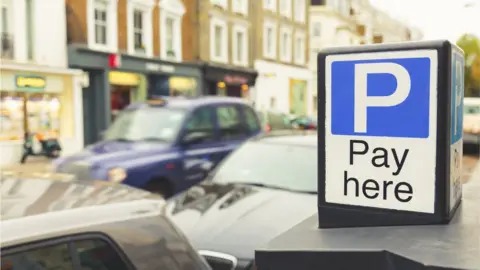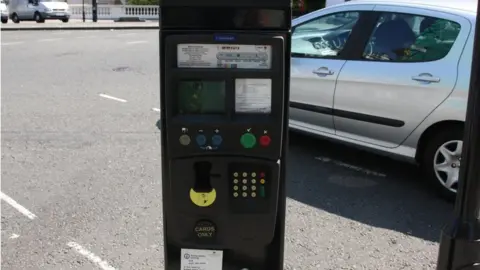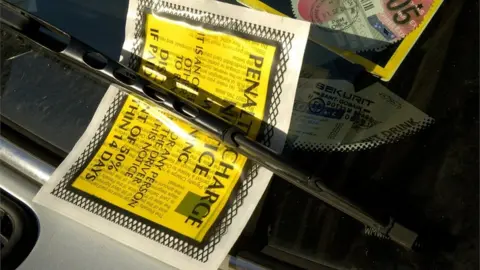Parking charges in Wales rose 4.5% to £37.4m
 Getty Images
Getty ImagesCouncils in Wales made a £14m profit in parking charges in the last financial year, a new report has revealed.
Local authorities charged motorists a total of £37.4m for on and off-street parking and penalties during the 12 months to April this year.
This was a 4.5% increase on the previous year, the RAC Foundation report said.
Nineteen of Wales' 22 councils posted profits for their parking services.
After deductions for expenditure, such as staff and equipment costs, the combined profit for Welsh councils for the financial year was up 1.4%, up from £13.8m to £14m.
A spokesman for the Welsh Local Government Association said it recognised parking charges remained controversial - but councils did consult with residents before making "difficult policy choices".
"Local authorities face a £192m shortfall in the next financial year that will grow to £570m by the end of 2019-20. A report published by the Wales Audit Office urged councils to pursue all options to generate income," said the WLGA official.
"The increase doesn't necessarily reflect increased charges across Wales, but as the RAC Foundation has previously noted, it may possibly reflect a recovering economy with people using their cars more."
The largest profit was made by Cardiff council, which made £3.66m, followed by Swansea at £2.47m and Gwynedd at £1.36m.
A spokesman for Cardiff council said: "Any surplus that is made in Cardiff is invested into transport projects.
"Cardiff's parking charges are very reasonable compared with other cities of a similar size and demographic. If the prices were lower, we would be encouraging more traffic on the highway network and into the city centre.
"The City council is committed to achieve a 50/50 modal split between those travelling by private car and alternative forms of transport. Our aspiration is to go a step further, to achieve a 60/40 modal split by 2024. Our Transport and Parking Strategy reflects this aspiration.
"Our pricing policy for on-street parking encourages short stay parking for visitors in the city centre. We want to increase residential parking in wards across the city, and incentivise commuters to either use Park & Ride or ideally encourage them to travel by bus or train.
"If people park illegally, they are putting other road users and pedestrians at risk. We will continue to target those that breach the law."

Three councils reported losses on their parking activities - Blaenau Gwent (£836,000), Flintshire (£127,000) and Torfaen (£72,000). The same three authorities reported losses in the previous financial year for parking services.
A Blaenau Gwent spokesman attributed the deficit to the authority's policy of not charging motorists to park in its towns.
Ceredigion council failed to respond to a request to comment on its 3.178% increase in parking charge profits (up from £16,000 in 2015-16 to £520,000 in 2016-17).
The data was collected and analysed by transport consultant David Leibling for the report published by motoring research charity the RAC Foundation.

Steve Gooding, director of the RAC Foundation, said: "The latest data shows there have been above-inflation increases in both council-parking income and expenditure across Wales. This has led to a relatively small rise in overall profits.
"Unsurprisingly the big numbers are associated with Cardiff and Swansea and underline the high demand for spaces in larger cities with more traffic to regulate.
"Places like Cardiff will not only be attracting local people but guests from around the country and beyond, so it is important that policy makers balance the management of congestion through parking charges with the need to make the city accessible and affordable for first-time and returning visitors.
"We were pleased to see it reported this week that Cardiff council has invested in 3,300 parking bay sensors which link to an app that drivers can use to help locate free spaces."
